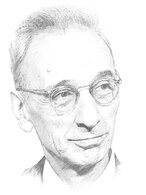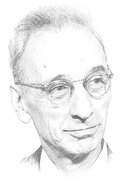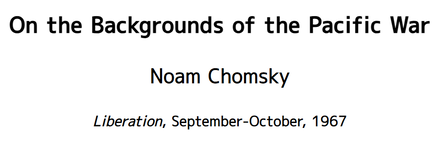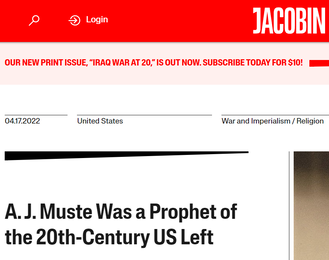AJ Muste
Abraham Johannes Muste (January 8, 1885 – February 11, 1967) was a Dutch-born American clergyman and political activist. He is best remembered for his work in the labor movement, pacifist movement, antiwar movement, and civil rights movement. In the fall of 1906, Muste went east to New Brunswick, New Jersey, to attend the Theological Seminary of the Dutch Reformed Church (now the New Brunswick Theological Seminary). While there, Muste took courses in philosophy at New York University and Columbia University, attended lectures by William James, and met John Dewey, who became a personal friend. While he remained in training to become a minister of the Reformed Church, Muste seems to have begun to question the church's fundamental principles at that time. He graduated in June 1909 and married his sweetheart from his Hope College days, Anna Huizenga. Muste then was appointed pastor of the Fort Washington Collegiate Church in the Washington Heights neighborhood of Manhattan, New York City. In his spare time, he used his new parish's proximity to the theologically-liberal Union Theological Seminary to take additional courses there.He ultimately received a Bachelor of Divinity from Union, graduating magna cum laude.
Bayard Rustin knew that winning required a team
“Because A.J. wasn’t here,” Bayard replied. A.J. Muste, a key mentor for Bayard, was an older radical pacifist organizer who had extraordinary consensus-building skills. I got it: Bayard knew that the rest of us, relying on Muste to forge our unity, might need Bayard to play that role in Muste’s absence.
(George Lakey/Waging Nonviolence 11/17/23)
READ MORE>>>>>
“Because A.J. wasn’t here,” Bayard replied. A.J. Muste, a key mentor for Bayard, was an older radical pacifist organizer who had extraordinary consensus-building skills. I got it: Bayard knew that the rest of us, relying on Muste to forge our unity, might need Bayard to play that role in Muste’s absence.
(George Lakey/Waging Nonviolence 11/17/23)
READ MORE>>>>>
A. J. Muste Was a Prophet of the 20th-Century US Left
This Easter, we should remember the rich tradition of Christian socialism in the US. And one of that tradition’s most important figures is the radical leader A. J. Muste, whose religious faith animated his commitment to socialism and nonviolence. The dominant historical narrative of the twentieth-century US left is overwhelmingly secular, neglecting the role of religion. Nowhere is that more evident than the virtual absence of A. J. Muste from American historical memory. When Muste appears in history books, it is often solely in reference to his influence on civil rights leaders Bayard Rustin and Martin Luther King Jr. (Leilah Danielson/Jacobin 4/17/22)
READ MORE>>>>>
This Easter, we should remember the rich tradition of Christian socialism in the US. And one of that tradition’s most important figures is the radical leader A. J. Muste, whose religious faith animated his commitment to socialism and nonviolence. The dominant historical narrative of the twentieth-century US left is overwhelmingly secular, neglecting the role of religion. Nowhere is that more evident than the virtual absence of A. J. Muste from American historical memory. When Muste appears in history books, it is often solely in reference to his influence on civil rights leaders Bayard Rustin and Martin Luther King Jr. (Leilah Danielson/Jacobin 4/17/22)
READ MORE>>>>>
 AJ Muste
AJ Muste
- The psychological basis for the use of nonviolent methods is the simple rule that like produces like, kindness provokes kindness, as surely as injustice produces resentment and evil. It is sometimes forgotten by those whose pacifism is a spurious, namby-pamby thing that if one Biblical statement of this rule is "Do good to them that hate you" (an exhortation presumably intended for the capitalist as well as for the laborer), another statement of the same rule is, "They that sow the wind shall reap the whirlwind." You get from the universe what you give, with interest! What if men build a system on violence and injustice, on not doing good to those who hate them nor even to those who meekly obey and toil for them? And persist in this course through centuries of Christian history? And if, then, the oppressed raise the chant:
Now the whirlwind you must dare,
As ye face upon the morrow,
The advancing Proletaire!
In such a day, the pacifist is presumably not absolved from preaching to the rebels that they also shall reap what they sow; but assuredly not in such a wise as to leave the oppressors safely entrenched in their position, not at the cost of preaching to them in all sternness that "the judgments of the Lord are true and righteous altogether."
--AJ Muste: "Recent Gains in the Quest for Peace" in The World tomorrow Vol. 11, No. 1 (January 1928), p. 8; including a quote from the Communist song "The Advancing Proletaire."
“There is no way to peace, peace is the way.” ― A.J. Muste
 AJ Muste
AJ Muste
- The great mass of 18-year olds ... are given no choice.... The older generation immolates the younger, on the alter of Moloch ]. What God, centuries ago, forbade Abraham to do even to his own son,—"Lay not thy hand upon the lad, neither do thou anything unto him" [Genesis 22:12]—this we do by decree to the entire youth of a nation. -AJ Muste
 AJ Muste
AJ Muste
Those who can bring themselves to renounce wealth, position and power accruing from a social system based on violence and putting a premium on acquisitiveness, and to identify themselves in some real fashion with the struggle of the masses toward the light, may help in a measure — more, doubtless, by life than by words — to devise a more excellent way, a technique of social progress less crude, brutal, costly and slow than mankind has yet evolved. -AJ Muste

In one of his last published essays, Muste describes himself as an “unrepentant unilateralist, on political as well as moral grounds. In part, he bases his position on an absolute moral commitment that one may accept or reject, but that cannot be profitably debated. In part, he defends it on grounds that seem to me not very persuasive, a psychological principle that “like produces like, kindness provokes kindness,” hence an appeal to “the essential humanity of the enemy.” It is very difficult to retain a faith in the “essential humanity” of the SS trooper or the commissar or the racist blinded with hate and fear, or, for that matter, the insensate victim of a lifetime of anti-Communist indoctrination. When the enemy is a remote technician programming B-52 raids or “pacification,” there is no possibility for a human confrontation and the psychological basis for nonviolent tactics, whatever it may be, simply evaporates. A society that is capable of producing concepts like “un-American” and “peacenik” — of turning “peace” into a dirty word — has advanced a long way towards immunizing the individual against any human appeal. American society has reached the stage of near total immersion in ideology. The commitment has vanished from consciousness — what else can a right-thinking person possibly believe? Americans are simply “pragmatic,” and they must bring others to this happy state. Thus an official of the Agency for International Development can write, with no trace of irony, that our goal is to move nations “from doctrinaire reliance on state enterprise to a pragmatic support of private initiative,” and a headline in the New York Times can refer to Indian capitulation to American demands concerning the conditions of foreign investment as India’s “drift from socialism to pragmatism.” With this narrowing of the range of the thinkable comes an inability to comprehend how the weak and dispossessed can resist our benevolent manipulation of their lives, an incapacity to react in human terms to the misery that we impose.

April 17, 2022
This Easter, we should remember the rich tradition of Christian socialism in the US. And one of that tradition’s most important figures is the radical leader A. J. Muste, whose religious faith animated his commitment to socialism and nonviolence..........
“Without a Vision, the People Perish
”Central to Muste’s enduring radical politics was his philosophy of history as a joint project of human beings and God. Drawing parallels to his biblical namesake, Muste held that history began when Abraham left the city of his ancestors. By going out to find “a city which existed — and yet had to be brought into existence,” Abraham demonstrated that divinity was to be found in the history of human work and creation.
For Muste, “the crucial thing about men, or societies, is not where they came from but where they are going.” It was precisely when “human communities” decided to “intervene in their own destiny” that history was made rather than lived.
The decades since Muste’s death haven’t been pretty for left-wing politics. The Left has faltered and declined, at times losing faith even in the power of human beings to make change. But Muste would have insisted on the human and divine imperative to continue dreaming and creating. “Without a vision, the people perish,” he wrote in 1955, at the height of the Cold War, paraphrasing Proverbs 29:18.
Regardless of whether one shares his pacifism or religious faith, Muste’s thoughtful and determined efforts to win a more just, peaceful world should inspire us to rebuild a dynamic left that can once again reshape US politics.
Full Article at: Jacobin: A. J. Muste Was a Prophet of the 20th-Century US Left
This Easter, we should remember the rich tradition of Christian socialism in the US. And one of that tradition’s most important figures is the radical leader A. J. Muste, whose religious faith animated his commitment to socialism and nonviolence..........
“Without a Vision, the People Perish
”Central to Muste’s enduring radical politics was his philosophy of history as a joint project of human beings and God. Drawing parallels to his biblical namesake, Muste held that history began when Abraham left the city of his ancestors. By going out to find “a city which existed — and yet had to be brought into existence,” Abraham demonstrated that divinity was to be found in the history of human work and creation.
For Muste, “the crucial thing about men, or societies, is not where they came from but where they are going.” It was precisely when “human communities” decided to “intervene in their own destiny” that history was made rather than lived.
The decades since Muste’s death haven’t been pretty for left-wing politics. The Left has faltered and declined, at times losing faith even in the power of human beings to make change. But Muste would have insisted on the human and divine imperative to continue dreaming and creating. “Without a vision, the people perish,” he wrote in 1955, at the height of the Cold War, paraphrasing Proverbs 29:18.
Regardless of whether one shares his pacifism or religious faith, Muste’s thoughtful and determined efforts to win a more just, peaceful world should inspire us to rebuild a dynamic left that can once again reshape US politics.
Full Article at: Jacobin: A. J. Muste Was a Prophet of the 20th-Century US Left

